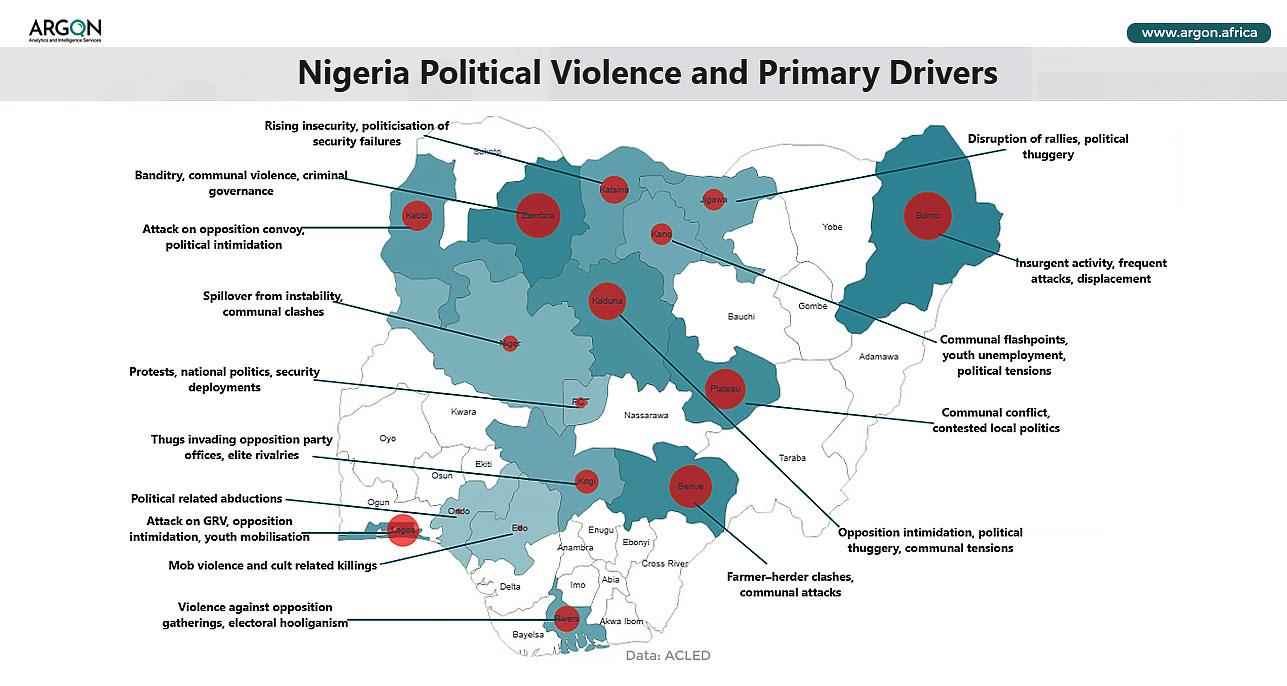Monitor
Advise
Influence
argon.africa
From Nigeria's commercial capital in Lagos to the northern states of Kaduna and Kebbi, the specter of political violence is resurfacing: a troubling reminder of Nigeria's fraught past. In recent weeks, attacks targeting opposition figures have raised alarms about how far the space for dissent is shrinking.
Recently in Lagos, Gbadebo Rhodes-Vivour (GRV), Labour Party's 2023 gubernatorial candidate, was attacked by hoodlums during a public outing. In Akure the Ondo state capital, ADC members were attacked in a meeting leaving several injured. These incidents are not isolated; they fit into a wider pattern of intimidation that undermines democracy.
In Kaduna, tensions between former governor Nasir El-Rufai and his onetime protégé, Governor Uba Sani, turned violent when thugs attacked members of the ADC and SDP, disrupting a political gathering. In Kebbi, the convoy of former Attorney General Abubakar Malami was ambushed en route to a condolence visit. Similarly in Katsina, thugs stormed a security meeting convened by elders, assaulting journalists in attendance. These incidents reflect a charged political atmosphere increasingly hostile to opposition voices.
Nigeria is not new to politically motivated violence. In the Second Republic, opposition politicians were hounded with violence, contributing to the eventual collapse of civilian rule. The 2003 elections saw widespread intimidation of voters and rivals, eroding public trust in institutions. Lagos itself has a long history of opposition harassment, from thugs invading campaign grounds to selective policing that leaves victims without justice.
The danger now is instability. Nigeria's young people, already restless under economic hardship, are watching these developments closely. Inflation sits above 25%, food prices in markets have more than doubled, and unemployment remains high. In the north, especially, where frustration is boiling over, organized opposition can tap into this anger to rally mass protests. That energy could be constructive if channeled into reform: but absent institutional safeguards, it risks exploding into violence.
History abroad offers sobering lessons. In Zimbabwe, the routine harassment of opposition politicians entrenched authoritarian control but eroded legitimacy and stability. More recently in Nepal, the government's decision to block Facebook, Instagram, WhatsApp, YouTube, and X triggered bloody protests that forced the Prime Minister to resign, sparking conversations on Nigerian social media. Young Nigerians often draw inspiration from political events abroad. The social media–driven, leaderless style of protests seen in Hong Kong in 2020 was a tactic later adopted during #EndSARS, showing how global protest strategies can quickly influence local movements

While data from the Armed Conflict Location & Event Data Project (ACLED) shows that political violence tends to spike by over 60% during election periods. The Argon Political Violence Dashboard indicates states like Kaduna and Lagos are now ticking several early-warning boxes: rising incidents of intimidation, elite squabbles and worsening economic hardship that inadvertently validate opposition grievances. These are precisely the conditions predictive models highlight as precursors to unrest.
The lesson is simple: political intimidation doesn't silence opposition; it strengthens it. Violence creates martyrs, mobilizes the young, and magnifies grievances. For Nigeria's rulers, the choice is stark. Either put a stop to the intimidation by upholding the rule of law, and protecting civic space, or risk watching frustration harden into rebellion and the opposition gaining public sympathy.
Nigeria has been here before. The question is whether it has learned enough to step away from the edge.
Similar Insights:
Loading similar insights...
